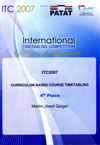The term „timetabling“ comprises a set of optimization problems with a considerable practical impact. Important areas within this context include employee timetabling, sports timetabling, flight scheduling, and timetabling in universities and other institutions of (often higher) education.
Over the years, significant progress has been made solving such problems, and nowadays a tremendous amount of heuristics is available. Unfortunately, several practical aspects are still not sufficiently well-understood, and thus call for a deeper analysis.
Our research is devoted to the development of (semi-)automated planning and optimization approaches, with a focus on university course timetabling problems. In particular, we focus on the multi-objective nature of these problems. In brief, our aim is to develop methodologies that allow for an interactive problem solution process, combining human based decision making and computer based optimization techniques.
International Timetabling Competition ITC 2017
Some first results have been obtained for the curriculum based course timetabling instances as proposed in the International Timetabling Competition ITC 2007. Our algorithmic approach and its computer implementation ranked 4th in this world-wide competiton.

Related key publications
 Martin Josef Geiger (2012):
Martin Josef Geiger (2012):
Applying the Threshold Accepting metaheuristic to curriculum based course timetabling – A contribution to the Second International Timetabling Competition ITC 2007.
Annals of Operations Research, Volume 194, Issue 1, April 2012, Pages 189–202, ISSN 0254-5330.
[doi:10.1007/s10479-010-0703-4]
 Martin Josef Geiger (2009):
Martin Josef Geiger (2009):
Multi-criteria curriculum based course timetabling – A comparison of a weighted sum and a reference point based approach.
In Matthias Ehrgott, Carlos Fonseca, Xavier Gandibleux, Jin-Kao Hao and Marc Sevaux (editors): Evolutionary Multi-Criterion Optimization – Proceedings of the 5th International Conference EMO 2009, Volume 5467 of the series Lecture Notes in Computer Science, Pages 290–304. Springer Verlag, Berlin, Heidelberg, 2009, ISBN 78-3-642-01019-4.
[doi:10.1007/978-3-642-01020-0_25]
Letzte Änderung: 25. November 2017